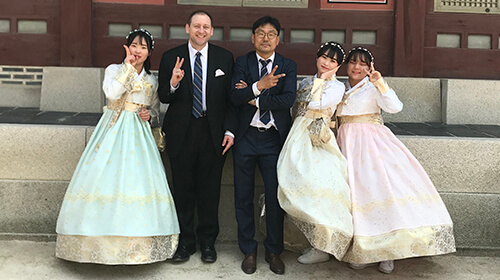
Wadas Recognized for Precision Imaging and Cancer Therapy Research

of the Korean Atomic Energy Institute) meet with students
during a scientific and cultural exchange in Seoul, South Korea.
Thaddeus Wadas, Ph.D., assistant professor of cancer biology at the Wake Forest University School of Medicine whose research has been funded by the North Carolina Biotechnology Center, has gained international recognition for his achievements in cancer imaging and radiotherapy research.
Wadas was selected to give the plenary presentation at the Korean Society of Radiopharmaceuticals and Molecular Imaging Probes Conference (KSRAMP) in Seoul, South Korea, in April. His lecture, titled Developing Zirconium-89 and Actinium-225 Radiopharmaceuticals for Precision Medicine Applications, highlighted his laboratory’s research efforts to make clinical positron emission tomography (PET) and targeted radiotherapy safer and more widely available for oncology patients seeking personalized treatment strategies.
“I was honored to represent Wake Forest University Health Sciences at the KSRAMP conference and humbled to be chosen as the plenary speaker for their national meeting,” Wadas said.
NCBiotech grant helped advance precision health innovation
Wadas received a $100,000 Biotechnology Innovation Grant from NCBiotech in 2016 to support his research. The grant program supports research studies that explore potential commercial applications of early-stage university inventions.
Wadas and his lab team, including Darpan Pandya, Ph.D., and Nikunj Bhatt, Ph.D., reported the development of ligands that form ultra-stable complexes with the radioactive metal zirconium-89, which is used in clinical immuno-PET imaging. They also demonstrated that their discovery is superior to the technology currently used to sequester this radioactive metal and should become a valuable tool for reducing radiation exposure to patients undergoing PET procedures in a clinical setting.
An article in the American Chemical Society journal Bioconjugate Chemistry said Wadas’ work “could revolutionize the field” of immuno-PET imaging.
While in South Korea, Wadas also gave lectures at the Kyungpook National University School of Medicine and the Korean Atomic Energy Institute. Those lectures dealt with research funded by the National Institutes of Health to develop a targeted alpha-particle-based radiotherapy for treating metastatic melanoma of the eye and skin. The therapy will enter first-in-human clinical trials in 2019.
“The Republic of South Korea is currently developing immuno-PET and targeted alpha particle-based radiotherapy strategies that will benefit all of the South Korean people, and we are very grateful to Dr. Wadas for sharing his knowledge and expertise in these areas,” said Seung Dae Yang, Ph.D., director of the Korean Atomic Energy Institute in Jeongeup, South Korea.
Wadas’ trip also included a scientific and cultural exchange with South Korean students to discuss the importance of pursuing careers in math, science and engineering.
